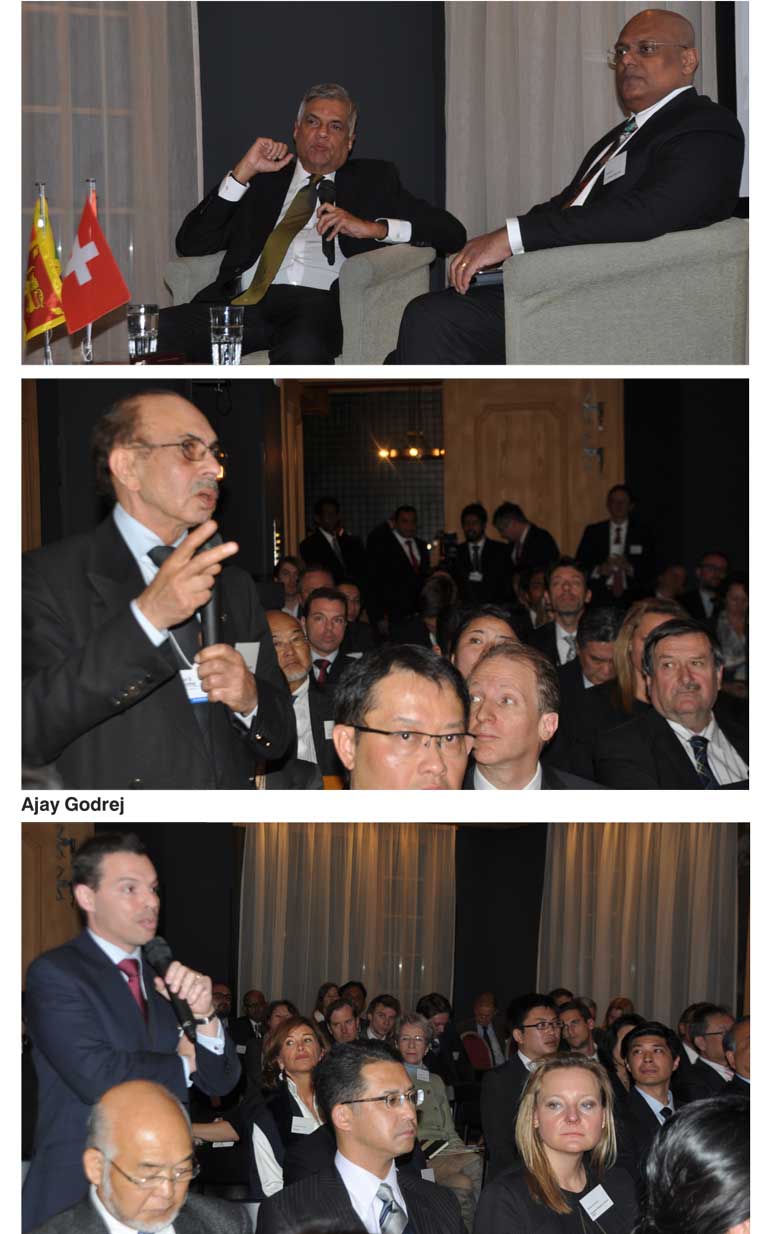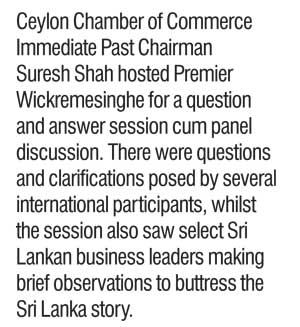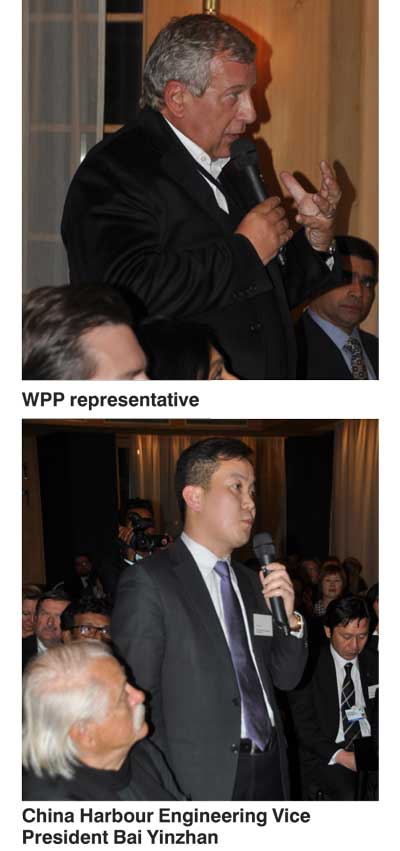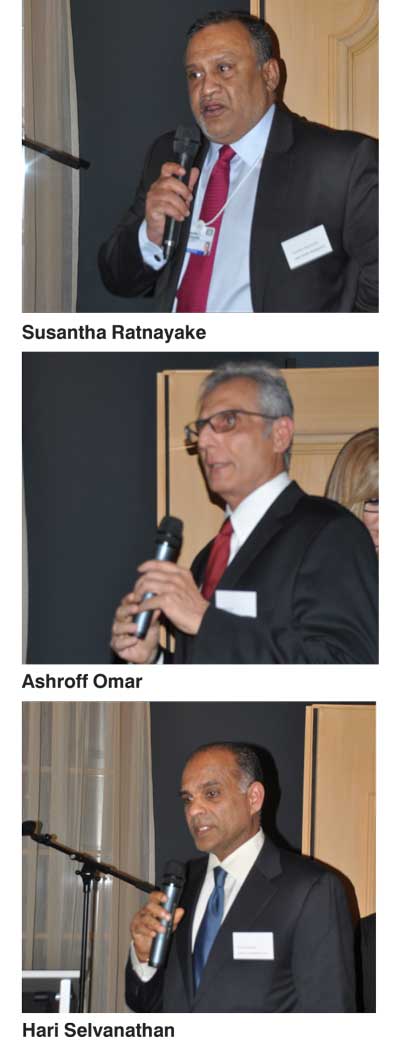Wednesday Feb 25, 2026
Wednesday Feb 25, 2026
Monday, 15 February 2016 00:03 - - {{hitsCtrl.values.hits}}


Q: 2016 is to be a difficult year. What are your views?
A: It is a difficult year but gradually I presume 2017 and 2018 should see better times. I see investments moving out of emerging markets to the West. Sri Lanka scores because the course has the benefit of being politically stable with a Government of two major parties and engaging a series of reforms. Together with the support of many countries, businesses are coming and in a difficult year globally there will be a few bright spots and Sri Lanka will be one of them.
Q: (Question from Five Elements Capital Sabine Nowak). What is the Government’s commitment to sustainable development?
A: Sustainable development is part of our election manifesto and we have committed ourselves to sustainable development especially environmental, health and education. We are increasing investment in these sectors.
We have decided to bring in the Sustainable Development Council law which will have the oversight for the sustainable development policy and advise the Government. Separately with components of sustainable development also being major items of the Government’s program I am confident of success. Education, health, gender and environment will be priority areas.
Q: (Question from a private equity fund) Around 44% of Sri Lanka’s energy is foreign sourced and accounted for 80% of exports bill. What plans for renewable energy?
A: There is feasibility study on nuclear energy. As far as is coal is concerned there is an agreement with India, we will go ahead with it. We will diversify our sources of energy and reduce dependence on coal. We are looking at increasing renewable energy sources.
Q: (Question from representative of global advertising giant WPP) When considering new investments there are three main factors. How are your visa policy, workforce skill level and the state of your bureaucracy? Are they business friendly?
A: Visas have been liberalised and further improvements are being pursued. We do have skilled people but we acknowledge that as rapid development takes place there will be shortages which can be bottlenecks. For this we are having crash programs for skills development. Regarding bureaucracy, we are improving efficiency and reducing where necessary. We are coming up with the Agency for Development which will reduce rules and regulations and intervention by bureaucracy.
Q: (Question from Ajay Godrej, Chairman of Godrej) India is the largest neighbour for Sri Lanka. Tell us about your vision for Indo-Lanka economic relations in the future?
A: Our relations span over 2,000 years. Let’s open it out. From the current FTA, we are pushing for an ETCA to ensure greater integration between the two economies. It has to happen. If you want high living standards for Indians and Lankans, there are lot of things which are complimentary to each other. To me India isn’t one economy but many.
 Q: What is the policy on expatriate labour and ethnic harmony?
Q: What is the policy on expatriate labour and ethnic harmony?
A: No major difficulty in foreign expatriates where skills are required and there is a local shortage.
Religious tensions are far more relaxed and less than those found elsewhere. We have had problems but in recent years there is growing recognition for harmony and there haven’t been any incidents.
Q: (Question from NACRE Gloal Asset Switzelrnad Dr. Katsura Suzuki). Japan is the biggest ODI supporter. What expectations from the private sector?
A: Many Japanese firms are looking at relocating. We were in Japan a few months ago and this is the impression I got. Japan is keen to help redesign Kandy city and there is scope for tourism.
Q: What are the prospects for the Eastern Province?
A: We are opening it up for tourism and the development of Trincomalee. Jaffna is progressing with resettlement. Japan has agreed to host a development forum with donor country agencies to raise a substantial amount of funding for the north and east. We are discussing with political leaders on the way forward.
Q: What plans for the healthcare sector and opportunities for the pharmaceutical industry?
A: We welcome pharmaceutical companies for export. We are discussing with doctors and specialists on how we can restructure the management and make it more demand-oriented, efficient and improve sources of funding.
Q: (Question by Edward Fernando who is engaged in waste management). We have exported over 25 million kilos of textile waste. This is in the absence of recycling plants. With GSP+ and the FTA with China and ambitious goals of $ 8.5 billion there will be more waste. I am here to raise capital for these initiatives. What level of inducement is on offer for recycling?
A: The Ministry of Megapolis is looking at a number of proposals received. The Sustainable Development Council will address the issue of waste and recycling as well.
Q: What is the progress you have made in addressing climate change and what support do you seek internationally?
A: In Sri Lanka, emission rates are very low. We spoke to the Swedish Prime Minister for technical support for the Sustainable Development Council and to modernise the Central Environmental Authority.
Q: What sectors is the Government keen on drawing FDIs and restricting?
A: We like FDIs for new sectors to generate employment. Those include IT, Tourism, Manufacturing, Smart Cities, etc.
Q: What is the future policy on financial inflows?
A: (Answer by Central Bank Governor) We are looking at an eventual abolition on any sort of controls on movement of capital or inflows. Given the current volatility it is not the best of times but we will do it gradually and improve the process of movement of capital.
Q: Sri Lanka competes with others for FDI. Why should investor choose SL over others?
A: Investors will choose what is best for them and they will come on the basis of competitive factors. Businesspeople will come to where it is good for them. My view is that we should make the Sri Lankan environment conducive and beneficial for both foreigners and locals to develop. We can make Sri Lanka sufficiently attractive for a larger number of foreign investors.
Questions to other participants
Q: (Question to Malik Samarawickrama): What is the role of the Agency for Development and the proposed one-stop shop?
A: The Agency for Development will be the focal point in attracting investors to Sri Lanka. It identifies and prioritises areas for investment. It will have private sector individuals as well. It will conduct road shows in major cities and highlight potential and opportunities. It will also focus on improving Sri Lanka’s ranking on the Ease of Doing Business Index and eliminating non-tariff  barriers as well. Implementing projects will be the role of the BOI which will be made more efficient.
barriers as well. Implementing projects will be the role of the BOI which will be made more efficient.
Q: (Question to Finance Minister Ravi Karunanayake) How do you foresee interest and exchange rates?
A: We are in talks with multilateral agencies for favourable developments and also boosting inflows. We are managing amidst external difficulties and are confident of success.
Comment by Brandix CEO Ashroff Omar on skills development
We have a literacy rate of over 95% and we find that the training of Sri Lankan people is very easy. For example the apparel industry provides technical and middle management for the whole of the Indian subcontinent including Bangladesh, India and Pakistan. The training of our people on technological and finance and accounting is easier and successful.
We recently brought in Accenture which has set up their BPO and we have grown to 600 seats and our target is to go up to 4,000 seats. It is not a call centre but financial and accounting and analytics. So training has been very successful and I am confident you can benefit a lot if you invest in Sri Lanka.
Q: (Question from moderator to JKH Chairman Susantha Ratnayake) Sri Lanka is strategically located amidst major global trade routes linking Europe, Africa and Asia. How important is the logistics sector for Sri Lanka and its growth prospects?
A: Sri Lanka’s strategic location, port and logistics sector will be critical and a major part of our future growth story. We have some of the most efficient deep water terminals in the world. In fact one of them was ranked fourth in the world and number one in South Asia in terms of productivity.
It is an example of Sri Lanka’s skills and the capability of our workforce. In the medium term, in the Colombo port there will be substantial investments required and with those planned. Hambantota is a new opportunity for investors. With logistics too, given the excellent air and sea connectivity, there is scope for distribution centres in Sri Lanka.
Q: (Question from moderator to Hari Selvanathan, Advisor to PM on tourism) Sri Lanka is a fantastic destination for tourism. What specific opportunities does it present?
A: Tourism is an important sector for the future of Sri Lanka. Sri Lankan skills are helping tourism in the Middle East, Maldives and elsewhere. The vision for tourism is to harness natural and cultural assets for sustainable growth and add value and maximise earnings for people.
The potential is greater than what it was a few years ago. In 1975 Thailand had a similar number like today. Today they are at 30 million tourists. We missed the opportunity but we have no regrets since we have a better place for investors and tourists. New international brands are setting up hotels along with dynamic local brands. The other sector with great potential is infrastructure development.
Comment by China Harbour Engineering Vice President Bai Yinzhan
We have been in Sri Lanka for over three decades and we have seen great potential. Going forward we hope to set up an industrial zone and a dockyard in Hambantota. We hope these opportunities will bring high growth for Sri Lanka.
Question and comment by Colombo Port City’s Liang Thow Ming
We invite those present to consider setting up in Port City. Regarding visas, I was recruited from Singapore. I was interviewed in 2014 November and started working in January 2015. It is easy to get foreign professionals to come to work.
Q: I noted in your speech there will be unique UK-like rules for the Port City. Can you clarify this?
A: It is a special financial district. We are looking at legislation in Hong Kong and Dubai which applies to English law. What is the mechanism and options for dispute resolution though the Supreme Court of Sri Lanka will have the final say? We are already talking to people at major legal firms for this. We are looking at a separate jurisdiction for the financial district of the Port City.